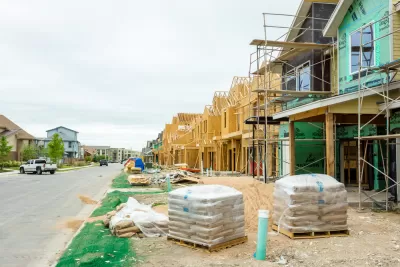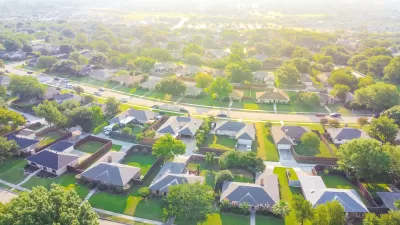Permits for new housing continue to lag despite a long economic boom. For coastal metros, it's a familiar story of job growth outpacing new construction. In some Sun Belt cities, sprawl is the bigger concern.

A recent study of national housing construction trends "found that 38 percent fewer housing units were permitted nationwide in 2018 than in 2005, the year permits peaked before the recession," Sarah Holder writes. During the period from 2008 through 2018, pretty much every major U.S. metro area permitted less new housing per 1,000 residents than from 1990 through 2007.
A substantial rise in multi-family home construction occurred over the past decade, especially on the coasts. But that hasn't extended to the kind of missing-middle housing many advocates say is necessary to weather the housing crisis. "In 1990, almost 5 percent of all residential permits were for duplexes, triplexes, and fourplexes, Apartment List found. By 2018, that share had dropped to 3 percent, while the average building size has doubled to 28.7 units."
Meanwhile, some Sun Belt cities are facing the opposite problem: they're creating more housing than jobs, "a dynamic that might say more about the clustering of economic development in coastal cities than the commitment to construction." Single-family home construction is predominant in many of those places, a bad sign for those who object to sprawl.
FULL STORY: The Cities Where Job Growth Is Outpacing New Homes

Alabama: Trump Terminates Settlements for Black Communities Harmed By Raw Sewage
Trump deemed the landmark civil rights agreement “illegal DEI and environmental justice policy.”

Study: Maui’s Plan to Convert Vacation Rentals to Long-Term Housing Could Cause Nearly $1 Billion Economic Loss
The plan would reduce visitor accommodation by 25% resulting in 1,900 jobs lost.

Planetizen Federal Action Tracker
A weekly monitor of how Trump’s orders and actions are impacting planners and planning in America.

Wind Energy on the Rise Despite Federal Policy Reversal
The Trump administration is revoking federal support for renewable energy, but demand for new projects continues unabated.

Passengers Flock to Caltrain After Electrification
The new electric trains are running faster and more reliably, leading to strong ridership growth on the Bay Area rail system.

Texas Churches Rally Behind ‘Yes in God’s Back Yard’ Legislation
Religious leaders want the state to reduce zoning regulations to streamline leasing church-owned land to housing developers.
Urban Design for Planners 1: Software Tools
This six-course series explores essential urban design concepts using open source software and equips planners with the tools they need to participate fully in the urban design process.
Planning for Universal Design
Learn the tools for implementing Universal Design in planning regulations.
Caltrans
Smith Gee Studio
Institute for Housing and Urban Development Studies (IHS)
City of Grandview
Harvard GSD Executive Education
Toledo-Lucas County Plan Commissions
Salt Lake City
NYU Wagner Graduate School of Public Service





























